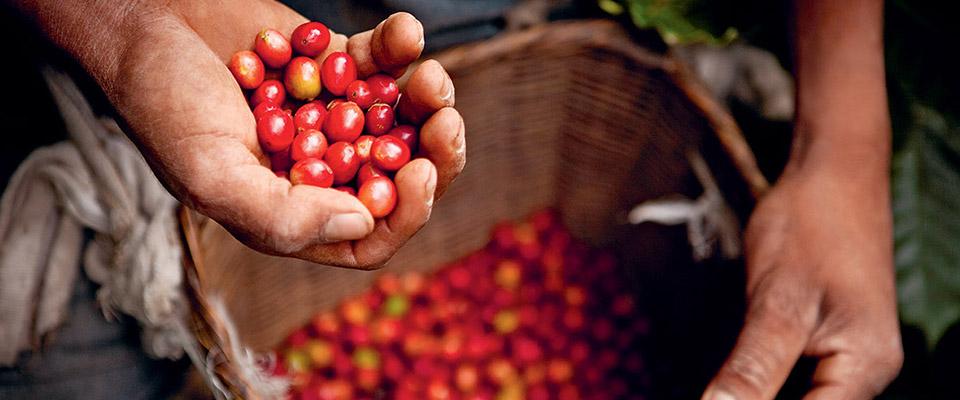Rural Development and Responsible Sourcing: Coffee
We are committed to supply chain excellence with the Nestlé coffee plan. From distributing millions of plantlets, to working with rural farmers, we offer support to our international partners.
At Nestlé, improving the quality, quantity, and sustainability of our coffee supply chain has been an ongoing initiative. Aging or diseased trees, declining yields, volatile prices, and climate change threaten the livelihoods of small farmers and the sustainability of the sector. Increasing demand, restricted land availability, and pressure for other crops present additional challenges.
We provide a range of support measures to tackle these issues and improve farmers’ livelihoods, helping them to sustainably manage coffee landscapes and remain compliant with our Responsible Sourcing Guidelines.
Our response has been to provide farmers new routes to market, disease-resistant plants, and technical assistance through the NESCAFÉ® plan, as well as the Nespresso® AAA Sustainable Quality™ Program.
Our Commitment: Continuously Improve Our Green Coffee Supply Chain
- By 2020, NESCAFÉ will improve the quality, quantity, and sustainability of its coffee supply chain by distributing 220 million coffee plantlets to coffee farmers
- By 2020, the company will source 100% of the coffee for the Nespresso range through its AAA Sustainable Quality™ Program on coffee sourcing, and improve farmer social welfare
- By 2020, NESCAFÉ will source 90,000 tons of coffee that is compliant with Sustainable Agriculture Network (SAN) principles
The NESCAFÉ Plan: What We’ve Achieved
In 2016, the NESCAFÉ Plan was active in 20 countries. Our 363 members of the Farmer Connect staff visited coffee farmers throughout the year, providing training, distributing plantlets, and providing technical assistance to help farmers implement practices aligned with the NESCAFÉ Better Farming Practices initiatives.
- In 2016, 28.3 million healthy coffee plantlets were distributed through the NESCAFÉ Plan to farmers worldwide. Together with 73.8 million plants distributed in 2012-2014 and 26.8 million in 2015, the total number of plants reached 129.0 million—well on the way to the company’s goal of 220 million plants by 2020
- In 2016, a total of 113,446 coffee farmers received technical assistance and training through the NESCAFÉ Plan, bringing the total since the Plan was launched in 2010 to 504,484
How We Source Coffee
Our coffee is sourced through both trade channels and our Farmer Connect direct sourcing channels, as part of our NESCAFÉ Plan and the Nespresso AAA Sustainable Quality™ Program. We source from coffee-growing regions across Latin America, Africa, and Asia.
The NESCAFÉ Plan is a global initiative that combines on-the-ground support for farmers, compliance with the Responsible Sourcing Guideline and improving the environmental impact of our NESCAFÉ factories, focusing on improving livelihoods of farmers and their communities, and assisting on the sustainable management of landscapes. The Plan also makes specific efforts to empower women and young people to become leaders in the coffee sector.
In addition, the Nespresso AAA Sustainable Quality™ Program, developed in collaboration with the Rainforest Alliance, aims to protect the highest-quality coffees required for Nespresso Grands Crus, preserve the environment, and enhance farmer welfare.
Did You Know? In 2016, Nestlé purchased 874,00 tons of coffee globally.
Improving Yields
Aged and/or diseased coffee trees affect quality and productivity and, therefore, farmers’ incomes. We make significant investments into researching plant science to develop stronger, disease-resistant, higher-yielding coffee trees. We distribute millions of new coffee trees each year to coffee farmers, enabling them to renovate their treestock and obtain better crops.
Supporting Good Agricultural Practices
In addition to productive trees, the quantity and quality of crops can also be improved by good agricultural practices. We provide technical assistance and training on farm management, including specific techniques such as pruning and soil management. Where relevant, we also fund programs to provide trees for essential shade to protect the coffee plants, especially from the effects of climate change.
Enhancing Rural Livelihoods
We source coffee from farmers across the world, where poor livelihoods are common in many rural areas. Rural poverty, in combination with a changing climate, poor soil management, and loss of biodiversity, represents a huge challenge to the long-term supply of safe, quality raw ingredients. A lack of nutrition and dietary diversity can be an issue for farmers and their families. In selected coffee origins, we offer advice and guidance on nutrition and dietary diversity to boost the health and well-being of the farmers.
We also assist coffee farmers to improve the economic returns from their crops and to help their communities be more resilient and successful. This especially includes younger farmers and farm workers, as well as women farmers, to enable them to get better access to training and to develop additional income streams to boost their finances.
In addition, we support actions that manage land more sustainably, including climate change adaptation, while ensuring compliant practices and working conditions.
